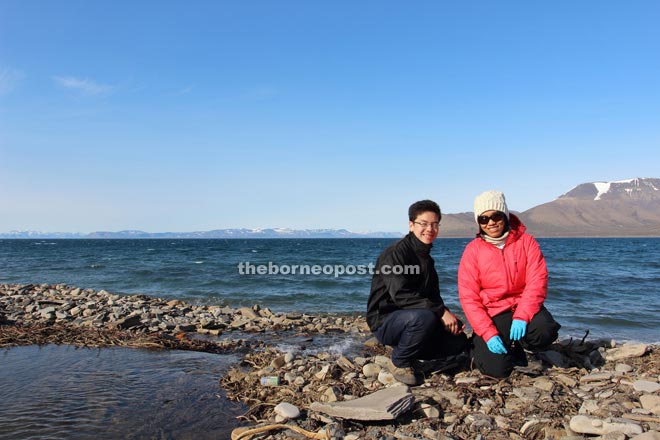
Sia (left) and Nastassia in the Arctic. They are two of only 18 students selected worldwide for the programme.
KUCHING: As part of their studies, two postgraduate students from Swinburne University of Technology Sarawak Campus are currently conducting research in the Arctic.
Science doctoral candidate Nastassia Denis and master in science student Edwin Sia were selected by The University Centre in Svalbard (UNIS), Norway, for the five-week programme to study Arctic microbiology.
UNIS, the world’s northernmost institution for higher education and research located in Longyearbyen, Spitsbergen offers courses at the undergraduate, graduate and postgraduate level in Arctic Biology, Arctic Geology, Arctic Geophysics and Arctic Technology.
“It is an honour for the students to be chosen for the programme as only 18 students worldwide are selected each year,” said Dr Moritz Müller, a biotechnology senior lecturer at Swinburne Sarawak who supervises Sia and Nastassia.
The UNIS programme is led by Professor David Pearce from Northumbria University in the UK.
“The main fascination about their research is that the environment in the Arctic, in terms of soil chemistry, is of a very similar type to the one in Sarawak but at totally different temperatures.
“So we are trying to see if we find the same microbes in both places and to understand if they are the same or different key players for the same kind of environmental processes,” said Müller, referring to such things as climate change, greenhouse gases and plant growth.
After her stint in the Arctic, Nastassia will head to the University of Bremen in Germany to work with Dr Thorsten Warneke on her research in comparing soil microbiology for about six months. This is expected to take place next year.
The University of Bremen is a top university in the area of research and one of the country’s 11 universities of excellence. It is the science centre of Northern Germany.
Sia will spend two months at the University of Manchester in the UK after completing the UNIS programme. He will study the organisms collected from his research and similar ones found in astrobiology with renowned microbiology Professor Jonathan Lloyd.
“We have a strong element of international collaboration in our environmental microbiology research,” said Müller, adding that Swinburne Sarawak and the University of Bremen are currently studying the release of greenhouse gases from rivers surrounded by peat in Maludam national park.
Sarawak offers a unique environment as the peat in Maludam, in the Betong Division, is undisturbed and in a natural state.
“The aim of Swinburne Sarawak’s research is to understand the microbiology of the peat-rich soil so that in the long term we can help to lessen the negative side effects of peat conversion, such as carbon dioxide emissions, by creating conditions to enhance the growth of pro-biotics to reduce the emissions of carbon dioxide,” he said.
